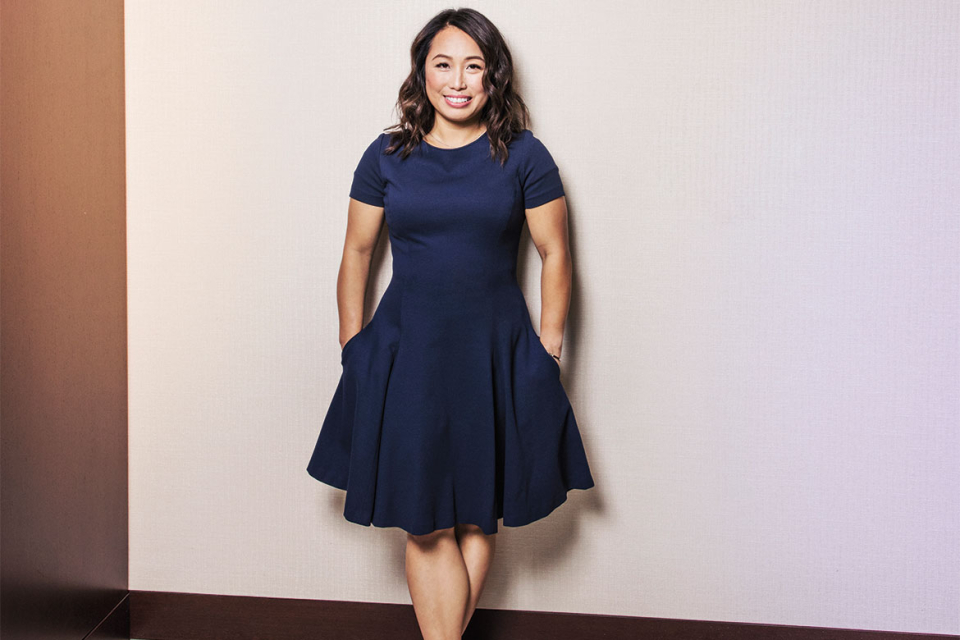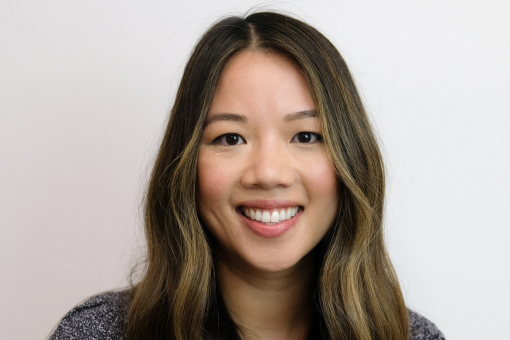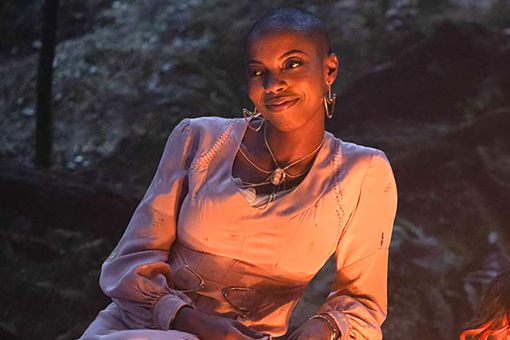She was a research analyst when she began her career at CBS in 2002, having proved herself as an intern.
Six promotions later, Noriko Kelley is executive vice-president of program planning and scheduling. The first woman to head scheduling at a broadcast network, Kelley succeeded Kelly Kahl in 2017 when he was named president of CBS Entertainment.
Kelley's duties include overseeing coordination between CBS programming divisions and network operations such as sales, news and the CBS Television Stations Group. In 2019, the ViacomCBS merger added more resources and new programming challenges to her plate. Kelley recently spoke with emmy contributor Dinah Eng via Zoom about her career and scheduling in the Age of Covid.
Why did you decide on a career in television?
I majored in East Asian languages and cultures at USC, and during my senior year I was interning for The Mainichi, a Japanese daily newspaper. I covered a movie premiere, which was really cool, and decided entertainment was what I wanted to do.
My parents, who are both teachers, recommended graduate school, so I decided to pursue a master's in communication management. I was able to get a research internship at CBS and got up really early to deliver the overnight ratings to everyone's in-boxes. The three-month internship turned into a full-time job as a research analyst.
What led you to program scheduling?
Scheduling is all about key decisions that affect the company in the short and long term. The broadcast network schedule is the first stop for a show's life. Beyond that, scheduling is about strategic positioning of shows and specials in a time period to gain the most viewers and the highest ratings.
We're also working now with cable partners through Viacom, which makes the job even more fun. For example, we simulcast the BET Awards on CBS and BET, and we did simulcasts with the Nickelodeon–Time Magazine Kid of the Year award.
I love getting to work with incredible people in all parts of the business. It's fast-paced and exciting. For scheduling in particular, it's about having a plan, a backup plan and contingency plans. I love being in a business where I can see the impact of my work on a daily basis, analyze the competition and also unwind from my day with a wide range of content.
You're one of the top Asian-American executives in television. How has your cultural background influenced your rise up the corporate ladder?
Everyone's family influences their career. I'm Japanese and Chinese, and my grandparents were immigrants. My Japanese grandparents, who were interned during World War II, helped raise me because my parents worked several jobs to make ends meet. Getting to watch TV with my grandparents was a huge treat.
When I thought about what I wanted to do, I never thought, "I want to be the first woman or first BIPOC [Black, indigenous or person of color] to head scheduling at a broadcast network." It was just about seeing what I wanted to do and accomplishing it. I firmly believe that stereotypes are meant to be broken. My rise up the corporate ranks is proof of that.
One of my favorite movies is Jiro Dreams of Sushi. I keep a quote from [master chef Jiro Ono, the subject of the documentary] on my iPhone that says, "Once you decide on your occupation… you must immerse yourself in your work. You have to fall in love with your work…. You must dedicate your life to mastering your skill. That's the secret of success."
That's how I want to feel about my career. I want that kind of longevity, enjoying what I do every day.
One of your most notable decisions was moving The Big Bang Theory from Monday to Thursday night in 2010. How do you gauge the success of such moves?
The success of a comedy in both original episodes and repeats is the dream of every network. When The Big Bang Theory moved, it helped to grow our Thursday night lineup and made our audience a lot younger.
Today, The Neighborhood leads a Monday night lineup of comedy and dramas that's bringing in a young, diverse audience. In the past few years, we've grown Monday-and Thursday-night comedies and [the legal drama] All Rise in a post– Big Bang Theory world. We've used NCIS to nurture shows like Bull or NCIS: Los Angeles and NCIS: New Orleans .
We're constantly looking at the daily numbers and DVR lift to see what resonates with viewers.
How have the streaming services influenced your decision-making?
Our decisions have always started with a strong slate of shows. Broadcast, cable, streamers — we're all coexisting in this TV universe. But broadcast is always going to be the first step for viewers.
We've learned that despite having many choices, viewers still crave a sense of structure and normalcy, especially in unprecedented times like now. There is still a sense of excitement for many viewers when new and returning favorite shows launch in the fall, and throughout the season.
Broadcast TV also serves as a collective unifying experience, whether it's by watching live news, sporting or music events with family and friends and even as a nation, and in sharing favorite scripted series' watercooler moments on social media.
In addition to being a broadcaster, we're also a content company. Viewers know there is a quality attached to CBS series, and that they can watch our shows live on-air, on demand or streaming on our app.
How has Covid-19 affected program planning and scheduling?
Every bit of scheduling prior to Covid prepared us for the pandemic. Scheduling is about flexibility and dealing with the unknown, which we were already doing.
Now, every day is different, with challenges getting shows up and on the air. For example, we used the first season of Star Trek: Discovery from CBS All Access to help fill the [CBS] air. In collaboration with partners at Viacom, we were able to bring back CBS Sunday Night Movies with films like Ferris Bueller's Day Off and Coming to America.
Live TV during a pandemic is even more challenging. We have SEC football, and when the Alabama–LSU game was postponed [after several LSU players tested positive for Covid-19], we had to reshuffle some of our holiday programming. Scheduling is about being creatively adaptable and having a game plan, which we always do.
What do you do when you're not working?
I'm a huge dog person. My husband and I started the pandemic with one 13-year-old dog. We've now expanded our crew with two puppies. It's been fun having three dogs because they enjoy having me work from home. They will sometimes want to join meetings, by squeaking a toy or having a play session as we talk. They are the perfect coworkers.
I also love to read, and being a TV executive, I love to watch TV in many different ways. I'll have my phone, iPad and laptop open while the TV's on, watching different shows. It drives my husband crazy.
So, what's the perfect schedule?
It's CBS's schedule.
More articles celebrating Asian American & Pacific Islander Heritage Month.
This article originally appeared in emmy magazine, issue No. 1, 2021











